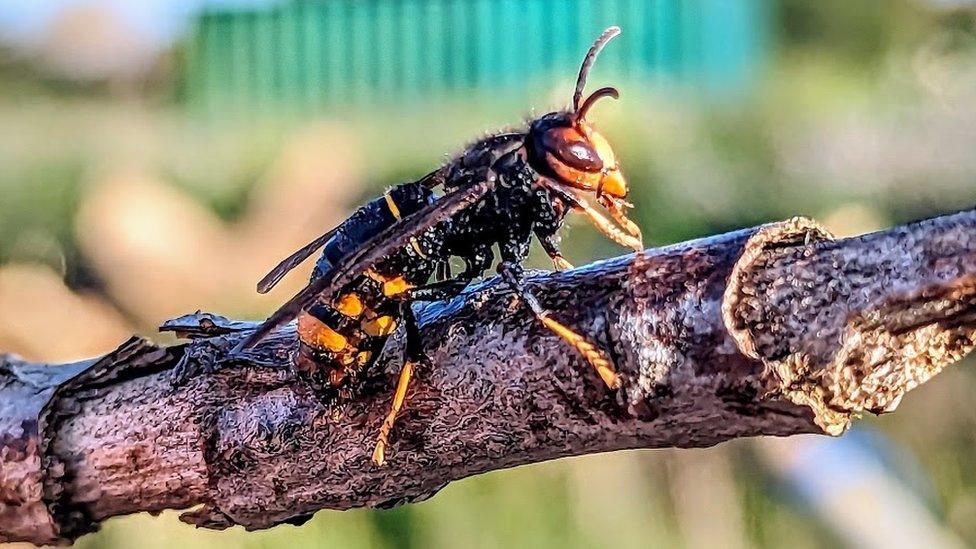Asian hornets: What are they and why are they bad for UK bees?
- Published
- comments

Scientists are worried about the impact these hornets are having on bee and wasp species in the UK
There's been a rise in sightings of the Asian hornet in the south of England.
Scientists, conservationists and beekeepers, are concerned about how these hornets could damage biodiversity.
Asian hornets feed on bees and wasps, so can have a devastating impact on the local insect populations.
In Kent, thousands of bees have been killed by Asian hornets.
Peter Down, a beekeeper in Capel-Le-Ferne, Kent, says only four or five of his 20 hives remain and the surviving bees are so stressed they are unable to produce any honey.
Peter wants the government Department for Environment Food and Rural Affairs (Defra) to work with the Animal Plant Health Agency (APHA) to tackle hornet nests quicker.
The British Beekeeping Association (BBKA) said: "The sharp increase in Asian/yellow-legged hornets in England is a serious concern."
A spokesperson for the APHA said: "We are committed to working closely with stakeholders who have been extremely helpful in increasing vigilance and awareness of Asian hornets."
What is an Asian hornet?
Asian hornets are smaller than hornets native to the UK - they're only a couple of centimetres long. They're also a darker colour than the hornets we are used to here.
The Wildlife Trust says if you think see an Asian hornet or Asian hornet nest, you should report it immediately.
This is because they are an invasive species, which means when they move to new places, they have a big impact on the local ecosystem.
The hornets feed on native wasps and bees. Native is a word we use to describe something that lives in the place it comes from. For example, we would say the bumblebee is native to the UK.
Why are they so dangerous?
Invasive species like the Asian hornet are putting native animals and plants in danger
Scientists say invasive species, like the Asian hornet, contribute towards 60 percent of extinctions around the world.
The main concern is for how they impact biodiversity - which is how lots of different animals and plants all work together in an area to keep it healthy for each other.
An example of this is bees - they feed on nectar from flowers, and then help the flower species grow by moving pollen around.
Can you think of all the different animals and plants that work together to keep this meadow running smoothly?
Species like the Asian hornet take over other populations, which means there aren't as many different types of insects to pollinate plants, and there aren't as many other insects to do the other jobs needed to keep an ecosystem running smoothly.
Imagine it like a computer - it works through many different parts combined together, and if you take one part away, it won't work the way it's meant to.
How did Asian hornets end up in the UK?
This is an Asian hornet nest - they're quite common in place like Catalonia in Spain
A lot of non-native species, like the Asian hornet, arrive in the UK on cargo ships from other countries.
The Asian hornet is currently widespread across Europe, and the populations can easily be blown over the Channel.
Climate change is having an impact as well - as colder areas heat up, non-native species are more likely to come in because they will be able to survive in the warmer conditions.
- Published21 July 2019
- Published30 July 2022
- Published3 October 2022
